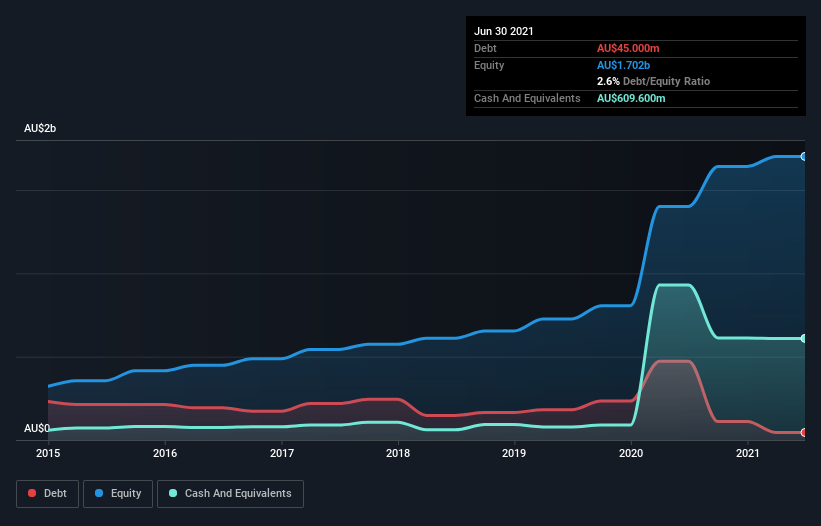Here's Why Cochlear (ASX:COH) Can Manage Its Debt Responsibly
Some say volatility, rather than debt, is the best way to think about risk as an investor, but Warren Buffett famously said that 'Volatility is far from synonymous with risk.' So it might be obvious that you need to consider debt, when you think about how risky any given stock is, because too much debt can sink a company. As with many other companies Cochlear Limited (ASX:COH) makes use of debt. But should shareholders be worried about its use of debt?
When Is Debt A Problem?
Debt is a tool to help businesses grow, but if a business is incapable of paying off its lenders, then it exists at their mercy. Part and parcel of capitalism is the process of 'creative destruction' where failed businesses are mercilessly liquidated by their bankers. However, a more common (but still painful) scenario is that it has to raise new equity capital at a low price, thus permanently diluting shareholders. Having said that, the most common situation is where a company manages its debt reasonably well - and to its own advantage. The first thing to do when considering how much debt a business uses is to look at its cash and debt together.
View our latest analysis for Cochlear
What Is Cochlear's Debt?
The image below, which you can click on for greater detail, shows that Cochlear had debt of AU$45.0m at the end of June 2021, a reduction from AU$473.0m over a year. But it also has AU$609.6m in cash to offset that, meaning it has AU$564.6m net cash.
A Look At Cochlear's Liabilities
According to the last reported balance sheet, Cochlear had liabilities of AU$402.5m due within 12 months, and liabilities of AU$334.0m due beyond 12 months. Offsetting these obligations, it had cash of AU$609.6m as well as receivables valued at AU$365.5m due within 12 months. So it can boast AU$238.6m more liquid assets than total liabilities.
This state of affairs indicates that Cochlear's balance sheet looks quite solid, as its total liabilities are just about equal to its liquid assets. So it's very unlikely that the AU$14.5b company is short on cash, but still worth keeping an eye on the balance sheet. Simply put, the fact that Cochlear has more cash than debt is arguably a good indication that it can manage its debt safely.
On top of that, Cochlear grew its EBIT by 57% over the last twelve months, and that growth will make it easier to handle its debt. The balance sheet is clearly the area to focus on when you are analysing debt. But ultimately the future profitability of the business will decide if Cochlear can strengthen its balance sheet over time. So if you're focused on the future you can check out this free report showing analyst profit forecasts.
Finally, while the tax-man may adore accounting profits, lenders only accept cold hard cash. Cochlear may have net cash on the balance sheet, but it is still interesting to look at how well the business converts its earnings before interest and tax (EBIT) to free cash flow, because that will influence both its need for, and its capacity to manage debt. In the last three years, Cochlear created free cash flow amounting to 10.0% of its EBIT, an uninspiring performance. For us, cash conversion that low sparks a little paranoia about is ability to extinguish debt.
Summing up
While it is always sensible to investigate a company's debt, in this case Cochlear has AU$564.6m in net cash and a decent-looking balance sheet. And it impressed us with its EBIT growth of 57% over the last year. So we don't think Cochlear's use of debt is risky. Over time, share prices tend to follow earnings per share, so if you're interested in Cochlear, you may well want to click here to check an interactive graph of its earnings per share history.
If, after all that, you're more interested in a fast growing company with a rock-solid balance sheet, then check out our list of net cash growth stocks without delay.
This article by Simply Wall St is general in nature. We provide commentary based on historical data and analyst forecasts only using an unbiased methodology and our articles are not intended to be financial advice. It does not constitute a recommendation to buy or sell any stock, and does not take account of your objectives, or your financial situation. We aim to bring you long-term focused analysis driven by fundamental data. Note that our analysis may not factor in the latest price-sensitive company announcements or qualitative material. Simply Wall St has no position in any stocks mentioned.
Have feedback on this article? Concerned about the content? Get in touch with us directly. Alternatively, email editorial-team (at) simplywallst.com.

 Yahoo Finance
Yahoo Finance 
